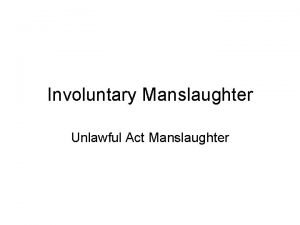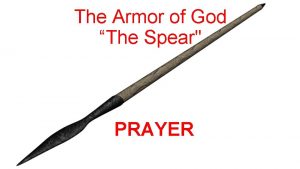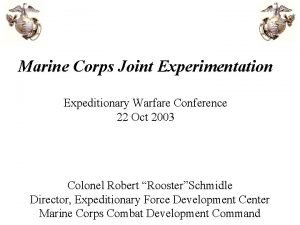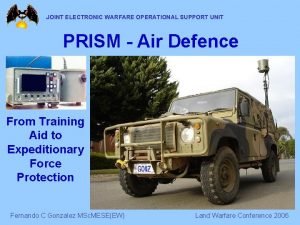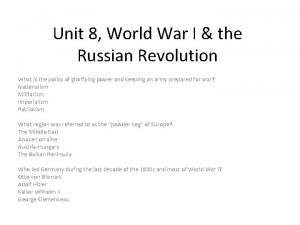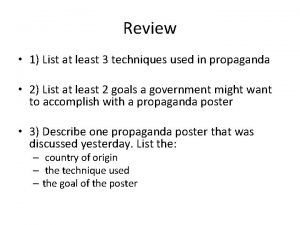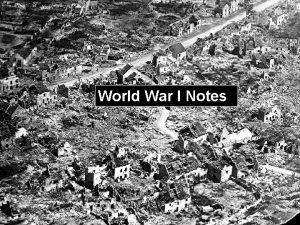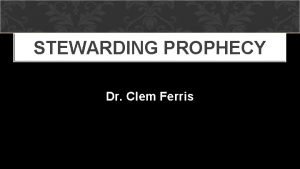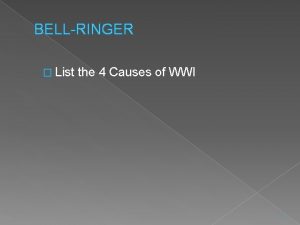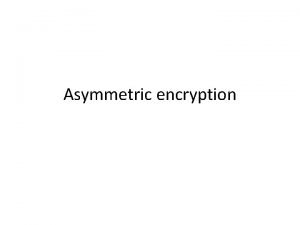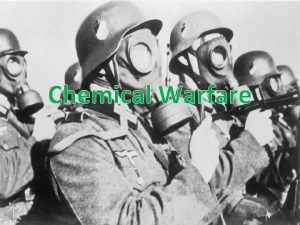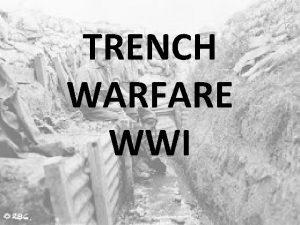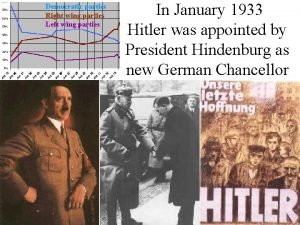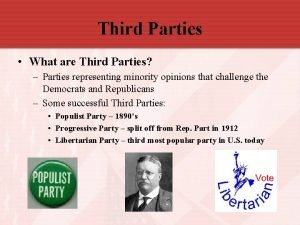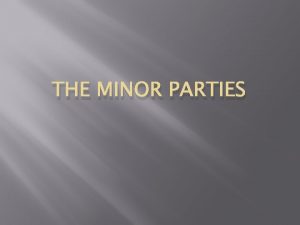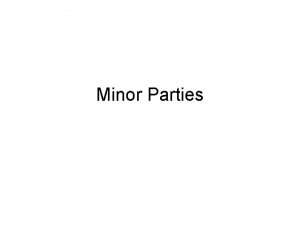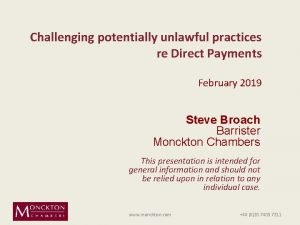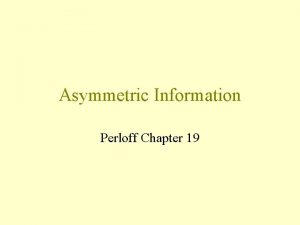Asymmetric warfare parties unlawful targets direct participations in

















- Slides: 17

Asymmetric warfare - parties - unlawful targets - direct participations in hostilites

Different types of asymmetry FORMS LEVELS Force Tactical Technological Operational Doctrinal Strategical Normative Moral Legal Ad bellum In bello

In bello asymmetry IAC NIAC Traditional rules of IAC, but The stereotypical situation : often twisted «Third category » always posed problems. Now : APIart 44, API art 75. Irak 2003 Israel – Hamas ? state versus non-state actor is the proto-type asymmetric armed conflict

PARTIES : who are the parties ? IAC PARTIES = NATIONS NIAC PARTIES = OTHER ENTITIES Non-state State function in relation to armed conflict STATUS = presumed function in relation to the armed conflict STATUS = the function in relation to the armed conflict LINK to party through nationality (or direct involvement) LINK to party through « entity » Nationality + function ”function” + function ?

PARTIES cont. NIACs – two possible solutions : A) state (all citizens) non-state organization Very asymmetric, no distinction possible IHL no role or very limited role ”terrorist-paradigm” B) entities engaged in armed conflict State : armed forces, political leadership, support-system Non-state : « armed forces of OAG » , political leadership, chain of support Recreation of trinitaian structure distinction possible on both sides ICRC guideline on DPH attempts to do this

ICA + NIAC + THIRD WAY ? Third way = a legal regime constructed to respons do third category. Problem : will inevitably undermine IHL. Counter – terrorism operations paradigm of law-enforcement Counter - insurgency operations paradigm of hostilities Targeted killings ? paradigm of law –enforcement TENDENCIES OF CONTROVERSY The Public Committee against Torture in Israel et al. V. The Government of Israel et al. , Supreme Court of Israel, 13 December 2006 Targeted killing as a method of counterinsurgency/anti-terrorist operations. COMPROMISE UAV-drones in counter-terrorist operations Effectsbased operations ( COIN)

TWO PARADIGMS HOSTILITIES ( IHL) LAW ENFORCEMENT AIM Weaken military force of Break up riots, unrest, dissolve HOW Disabling (kill, injure, Arrest, trial and punishment. Killing WHO MEANS organization capture) the greatest number of insurgents criminal organizations only in self-defence or in case of resistance Members of armed forces Rioters, criminals or OAG. Persons DPH All lawful means & methods of combat All lawful exercise of police powers

TWO PARADIGMS HOSTILITIES ( IHL) RULES IHL : distinction Proportionality between collateral damage and military advantage anticipated (from attack) no unnecessary suffering or superfluous injury, lawful means of war LAW ENFORCEMENT IHRL : Protect innocent bystanders Proportionality (entire undertaking) Graduated use of force ( only force necessary to arrest / disarm) Lawful means of riot-control ( teargas, non-lethal weapons etc)

Targeted killings case ( HCJ) Weakening the military force of terrorist organizations Disabling terrorists = arrest, detention, trial Hostilites Law-enforcement Use of means the least injurious to terrorists and innocent bystanders Law-enforcement Proportionality between collateral damage and the disablement of terrorists Means : Targeted killing Law-enforcement Hostilites

STATUS IAC DEFINITION Definition of combatant ( GC art 4, API art 43 Negative definition of civilian API 50(1) presumption of civilian status ( in the battlefield) API art 50 (1) presumption of combatant status (upon capture) API art 45(1) E. G ”protected person” = enemy civilians NIAC DEFINITION No definition of combatant Civilian ? APII art 13 : « protection of the civilian population »

UNLAWFUL TARGETS IAC NIAC 1) Belligerents hors de combat 1) 2) Groups with special protection (medical personnel, red cross, UN – peace keepers) 2) Groups with special protection (medical personnel, red cross, UN- peace keepers) 3) Civilian population and individual civilians shall not be the object of attack APII art 13 (2) 3) Civilian population and individual civilians shall not be the object of attack. API art 51(2) Civilians enjoy protection « unless and for such time as they take a direct part in hostilites » API art 51(3) CUSTOM Belligerents hors de combat Civilians enjoy protection « unless and for such time as they take a direct part in hostilites » APII art 13(3) CUSTOM

Unlawful targets cont. « Unless and for such time as they take a direct part in hostilites » APIart 51 (3), APII art 13(3) when DPH = no protection against direct attack In practice, DPH defines target –immunity (and the importance of civilian status) in NIACs, since target immunity is defined negatively from DPH WHEN a person is DPH can be directly targeted no rights to be protected from the effects of hostilites does not count in proportionality test ! WHAT ARE THE REQUIREMENTS FOR DPH ? Narrow or wide ? ANALOGY FORM IAC ?

DIRECT PARTICIPATION IN HOSTILITES IAC COMBATANTS : Members of armed forces APIart 43 Militias etc : if CGart 4(2) or APIart 44 (OAG belongs to party if its acts are attributable to the State which is party) Can be targeted at all times DPH : only loss of target immunity « for such time as » ( art 51 (3) NIAC Are all belligerents only targetable « for such time as » they participate in hostilites ? ( NO) Are only member of the armed forces targetable at all times ? ( NO) criteria is ” CONTINUOUS COMBAT FUNCTION Targetable for as long as person retains a continuous combat function

ICRC Guidance on DPH No codified or customary rule on DPH ICRC guidance the best point of departure: Specific act as part of conduct of hostilites Preparatory acts to the specific acts, deployment to and return from the location of its execution are integral parts of the act Not unlawful target « for as long as » : API 51(3), APII 13(3) Two types of DPH : ordinary civilians who DPH (I) members of OAG : (II)

ICRC guidance cont. DPH (I) For civilians ( other than combatants or person with a continuous combat function): i. e civilian DPH : regain target immunity when DPH is over: APIart 51(3) APII art 13(3 DPH in APIart 51(3) and APII art 13(3) = preparation, hostile act, return from act 3 ELEMENTS OF ACT in order to constitute DPH: THRESHOLD OF HARM : the act must be likely to adversely affect the military capacity of the adversary or inflic death or destruction on protected persons or objects DIRECT CAUSATION : causal link between the act and the harm caused BELLIGERENT NEXUS : act must be designed to cause harm in support of one party to the conflict and to the detriment of another Civilian DPH regains target immunity when hostile act is carried through and has returned from act ( « for such time as » ) Same DHP in IAC and NIAC - API art 51(3), APII art 13(3)

ICRC Guidance cont. DPH (II) For members of armed groups : regain target immunity when cease to assume a continuous combat function DPH = have a continuous combat function Must be member of organized armed group (OAG) Must have a continuous combat function in relation to armed conflict Regain target immunity when have changed function from continuous combat function within group, or when has ended its affiliation with the group DPH ressembles situation of combatants : armed forces of States and members of organized armed groups with a continuous combat function are put in the same position with resepct to target immunity. ICRC : added general principle of restraint on the use of force against all lawful targets. ( Lex ferenda for the time being). Only the amount of force necessary.

Sum up Asymmetric armed conflict =>the in bello expression is NIAC In NIAC : DPH = core definition to determine who are lawful or unlawful targets, and hence who are « civilians » in the sense of conduct of hostilites ( to whoom rules of distinction, proportionality, precaution in attack applies) DHP Two types of DPH : DPH (i) : specific acts carried out by civilians. Target immunity regained once the act is terminated ( NARROW) AND DHP (ii) : continuous combat function in OAG. Target immunity regained when the function is terminated (WIDE : similar to combatant)
 Participations and residuals
Participations and residuals Loan participation accounting
Loan participation accounting Examples of involuntary manslaughter
Examples of involuntary manslaughter Unlawful act manslaughter definition
Unlawful act manslaughter definition Spear in spiritual warfare
Spear in spiritual warfare Ndia expeditionary warfare conference
Ndia expeditionary warfare conference Guerilla warfare
Guerilla warfare Jewosu
Jewosu Olmec family life
Olmec family life Ephesians weapons of warfare
Ephesians weapons of warfare What was trench warfare intended to accomplish
What was trench warfare intended to accomplish German unrestricted submarine warfare
German unrestricted submarine warfare Nswc pd
Nswc pd M.a.n.i.a ww1
M.a.n.i.a ww1 Clem ferris
Clem ferris Why were military leaders baffled by trench warfare?
Why were military leaders baffled by trench warfare? Battleground for spiritual warfare
Battleground for spiritual warfare Ptsd spiritual warfare
Ptsd spiritual warfare


